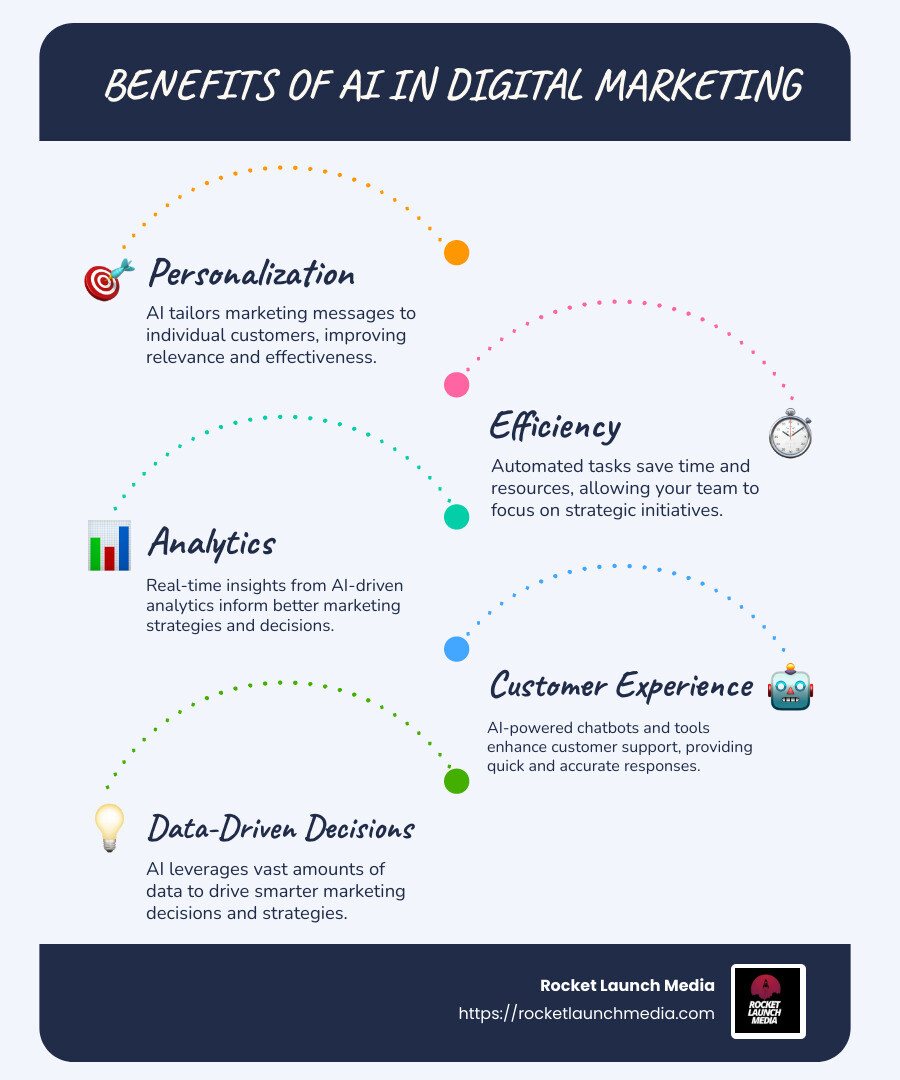AI Digital Marketing: Transforming the Future of Business
Artificial intelligence is revolutionizing the marketing landscape, making it a game-changer for businesses today. By enabling smarter, data-driven decisions, AI is reshaping digital marketing. If you’re curious about “ai digital marketing,” here’s a quick overview:
- Personalization: AI customizes marketing messages for individual customers.
- Efficiency: Automated tasks save time and resources.
- Analytics: Real-time insights lead to better strategies.
- Customer Experience: Chatbots and AI tools enhance support.
AI in digital marketing is redefining how businesses engage with their customers. By leveraging data for highly personalized and efficient campaigns, AI offers unparalleled opportunities in customer engagement and operational efficiency.
As the founder and CEO of Rocket Launch Media, I’ve witnessed firsthand how AI can transform marketing strategies. Over the last decade, my team and I have consistently driven significant growth for our clients through innovative AI-driven digital marketing solutions.

Ai digital marketing vocab to learn:
PROMPT:
The above is an intro section for an article titled “The Complete Guide to AI Digital Marketing,” about the keyword “ai digital marketing,” written for the company Rocket Launch Media, to be published on https://rocketlaunchmedia.com/.
What is AI in Digital Marketing?
Artificial intelligence (AI) in digital marketing is all about using advanced technologies to improve marketing efforts. It helps businesses automate decisions, analyze data, and predict trends. Let’s break down how AI is changing the game.
AI Technologies
AI technologies include machine learning, natural language processing (NLP), and computer vision. These tools can understand and process large amounts of data quickly.
For instance, machine learning helps algorithms learn from past data to make better decisions in the future. NLP enables chatbots to understand and respond to customer queries, while computer vision can analyze images and videos to gather insights.
Automated Decisions
AI can automate repetitive tasks, freeing up your team for more strategic work. Think of tasks like:
- Content Generation: Tools like Jasper AI can create blog posts, social media content, and more.
- Email Marketing: AI can personalize email content based on user behavior.
- Ad Placement: AI can optimize where and when to place ads for maximum impact.
For example, Rocket Launch Media’s AI Suite handles tasks like keyword tracking and performance monitoring, allowing your team to focus on strategy.
Data Collection
AI excels at collecting and analyzing data from various sources. This includes:
- Social Media: Tracking engagement and sentiment.
- Market Trends: Analyzing economic trends to predict future behaviors.
- Consumer Behavior: Understanding how customers interact with your brand.
By analyzing this data, AI can provide actionable insights, helping you optimize your marketing efforts.
Audience Analysis
AI helps you understand your audience better. It can segment your audience based on behavior, preferences, and demographics. This allows you to create more personalized marketing campaigns.
For example, AI can analyze customer interactions to identify patterns and preferences. This enables businesses to tailor their marketing efforts to meet specific needs, improving engagement and conversion rates.
Economic Trends
AI can also keep an eye on broader economic trends. By analyzing market data, AI can predict future trends, helping you stay ahead of the curve. For instance, a retailer might use predictive analytics to stock up on inventory ahead of a predicted surge in demand.

In summary, AI in digital marketing is all about using advanced technologies to automate tasks, analyze data, and predict trends. By leveraging AI, businesses can create more personalized and efficient marketing campaigns, leading to better customer engagement and higher ROI.
Next, let’s dive into the benefits of AI in digital marketing, exploring how it can improve your marketing efforts.
Benefits of AI in Digital Marketing
AI is revolutionizing digital marketing, offering numerous benefits that can significantly improve your marketing efforts. Let’s explore some key advantages.
Personalized Experiences
One of the standout benefits of AI in digital marketing is its ability to deliver highly personalized experiences. AI algorithms analyze vast amounts of data to understand individual preferences, behaviors, and purchasing patterns.
For example, AI-powered recommendation engines suggest products or content based on users’ past behaviors. This personalization not only increases user satisfaction but also boosts conversion rates and customer loyalty.
Data Analytics
AI excels at processing and analyzing large volumes of data quickly and accurately. Traditional data analysis methods can be time-consuming and prone to human error. AI-driven analytics tools, however, can sift through data sets in real-time, identifying trends, patterns, and insights that might otherwise go unnoticed.
These insights inform marketing strategies, helping businesses make data-driven decisions. For example, AI can identify which marketing channels are driving the most traffic and conversions, enabling marketers to allocate their budgets more effectively.
Customer Engagement
AI can significantly improve customer engagement through personalized interactions. AI-powered chatbots, for instance, provide efficient and effective customer support. These virtual assistants can answer frequently asked questions, process orders, and offer personalized product recommendations.
Chatbots are available 24/7, ensuring that customers receive immediate assistance regardless of the time of day. This not only improves customer satisfaction but also frees up human agents to handle more complex queries.
Operational Efficiency
AI can automate repetitive tasks, freeing up your team for more strategic work. This improves operational efficiency. For instance, AI can automate the bidding process for pay-per-click (PPC) campaigns, adjusting bids in real-time to achieve the best possible results. This level of automation reduces the need for manual intervention, saving time and resources.
Predictive Analytics
Predictive analytics is another area where AI shines. By examining historical data, AI can predict future outcomes, such as which products are likely to be popular, when demand will peak, and which customers are at risk of churning.
These predictions enable marketers to proactively address potential issues and capitalize on opportunities. For example, a retailer might use predictive analytics to stock up on inventory ahead of a predicted surge in demand.
AI-Powered Chatbots
AI-powered chatbots are becoming increasingly popular as a means of providing efficient and effective customer support. These virtual assistants can answer frequently asked questions, process orders, and offer personalized product recommendations.
Chatbots are available 24/7, ensuring that customers receive immediate assistance regardless of the time of day. This not only improves customer satisfaction but also frees up human agents to handle more complex queries, increasing overall efficiency.
Digital Advertising Optimization
AI is changing digital advertising by enabling more precise targeting and optimization. Machine learning algorithms can analyze user data to identify the optimal times for displaying ads, the most effective ad formats, and the ideal audience segments. This ensures that ads reach the right people at the right time, maximizing the return on investment (ROI).
Additionally, AI can automate the bidding process for pay-per-click (PPC) campaigns, adjusting bids in real-time to achieve the best possible results. This level of automation reduces the need for manual intervention, saving time and resources.
Content Creation
AI is also making its mark in content creation and curation. Tools like natural language generation (NLG) can create high-quality written content, including product descriptions, blog posts, and social media updates, with minimal human intervention. This is especially beneficial for businesses that need to produce large volumes of content rapidly.
Recommendation Engines
AI-powered recommendation engines analyze users’ past behaviors and preferences to suggest products or content they are likely to enjoy. This not only improves user satisfaction but also increases conversion rates and customer loyalty.
Customer Satisfaction
By delivering personalized experiences, improving customer engagement, and providing efficient support, AI can significantly boost customer satisfaction. Satisfied customers are more likely to become repeat buyers and brand advocates.
ROI Improvement
The main goal of using AI in digital marketing is to increase performance and ROI for your campaigns. By using data analytics and insights, AI helps produce better marketing assets in real-time, saving your marketing team time and money. This allows them to work more efficiently and increase profits.

Next, let’s explore how to implement AI in your digital marketing strategy, including acquiring AI skills, selecting the right tools, and ensuring data management and compliance.
How to Implement AI in Your Digital Marketing Strategy
Implementing AI in your digital marketing strategy can seem like a daunting task, but breaking it down into manageable steps can simplify the process. Here’s how to get started:
AI Skills Acquisition
First, you need to equip your team with the necessary skills to leverage AI effectively. This involves:
- Training: Enroll your team in AI and machine learning courses. Platforms like Coursera and Udemy offer specialized courses.
- Workshops: Host internal workshops or bring in experts to train your team on AI tools and techniques.
- Certifications: Encourage team members to obtain certifications in AI-related fields to ensure they have a solid understanding.
AI Applications in Marketing
Identify where AI can make the most impact in your marketing efforts. Common applications include:
- Data Analysis: Use AI to analyze large datasets for insights.
- Customer Segmentation: AI can segment your audience based on behavior and preferences.
- Content Creation: Automate content generation with AI tools like Jasper and ChatGPT.
- Ad Targeting: Optimize ad placements and budgets using AI-powered tools.
Business Plan Creation
Develop a business plan that outlines your AI implementation strategy. Key components should include:
- Objectives: Define clear goals for what you want to achieve with AI.
- Timeline: Set realistic deadlines for each phase of implementation.
- Budget: Allocate resources for AI tools, training, and potential consultancy fees.
Team Building
Assemble a team that will spearhead your AI initiatives. This team should include:
- Data Scientists: Experts who can handle data analysis and machine learning models.
- Marketing Strategists: Professionals who understand how to integrate AI into marketing strategies.
- IT Support: Technicians who can manage the technical aspects of AI tools and integrations.
Tool Selection
Choosing the right AI tools is critical. Here are some top tools to consider:
- Jasper AI: For copywriting and content creation.
- Surfer SEO: For optimizing SEO content.
- Chatfuel: For building AI-powered chatbots.
- Albert.ai: For digital advertising optimization.
Evaluate each tool based on your specific needs and budget.
Strategic Partnerships
Form partnerships with AI vendors and consultants who can provide expertise and support. This can help you:
- Access Advanced Tools: Gain access to cutting-edge AI technologies.
- Receive Expert Guidance: Benefit from the experience and knowledge of AI specialists.
- Ensure Smooth Implementation: Get help with troubleshooting and optimizing AI applications.
AI Integration
Integrate AI into your existing marketing platforms. This might involve:
- APIs: Use APIs to connect AI tools with your CRM, email marketing, and social media platforms.
- Custom Solutions: For more complex needs, consider developing custom AI solutions with the help of your IT team or external consultants.
Data Management
Effective data management is crucial for AI success. Ensure you:
- Collect Quality Data: Gather accurate and relevant data for AI analysis.
- Maintain Data Security: Protect your data with robust security measures.
- Regular Updates: Keep your datasets current to ensure AI tools provide accurate insights.
Compliance Measures
Finally, ensure your AI initiatives comply with relevant regulations. This includes:
- GDPR: Adhering to data protection regulations if you’re operating in the EU.
- Ethical AI: Implementing AI in a way that is fair, transparent, and accountable.
- Privacy Policies: Updating your privacy policies to reflect your use of AI and data handling practices.
By following these steps, you can effectively implement AI in your digital marketing strategy and open up its full potential. Next, we’ll explore some of the top AI marketing tools you can use to grow your business in 2024.
Top 22 AI Marketing Tools to Grow Your Business in 2024
Jasper AI (for copywriting)
Jasper AI is a powerhouse for copywriting and content creation. Originally known as Jarvis, Jasper can generate engaging content in various tones and styles. It’s read 10% of the internet, making it highly knowledgeable. Jasper can handle blog posts, social media updates, and email content, helping you keep up with the demand for fresh, SEO-optimized content. Companies like Marvel have recognized its potential, leading to a rebranding from Jarvis to Jasper.
Notion AI (for productivity)
Notion AI is a productivity booster within the popular project management tool, Notion. It helps teams stay organized by automating tasks like answering questions, brainstorming ideas, and filling out tables. Notion AI acts like a built-in personal assistant, making project management and collaboration smoother and more efficient. It’s a valuable addition for teams looking to streamline their workflows.
Surfer SEO (for content writing)
Surfer SEO is an essential tool for anyone focused on SEO content. It helps you create content that ranks well on search engines by providing data-driven recommendations on keyword density, readability, and structure. Surfer SEO integrates with tools like Jasper, WordPress, and Google Docs, making it easier to optimize content as you write. Clients like FedEx and Shopify have seen success using Surfer SEO to hit their organic growth metrics.
Lexica Art (for blog thumbnails)
Lexica Art is an AI image generator perfect for creating blog thumbnails and other visual content. It produces realistic images that can be customized to fit your brand guidelines. If you’re tired of using standard stock images, Lexica Art offers a fresh alternative. This tool is especially useful for enhancing the visual appeal of your content and social media posts.
Content at Scale (for generating SEO blog posts)
Content at Scale is designed for generating high-quality, SEO-friendly blog posts. It’s known for producing content that passes AI detectors, often appearing 70% human-written. While the UI can be a bit buggy, the quality of content it generates is impressive. This tool is ideal for keeping up with the demand for fresh content without sacrificing quality.
Originality AI (for AI content detection)
Originality AI is a crucial tool for detecting AI-generated content and plagiarism. It’s useful for ensuring the originality of your content, especially if you’re using AI writing tools. Originality AI helps you identify areas that need human touch, making it a valuable tool for content quality control.
Writer (content writing for teams)
Writer is a collaborative writing tool designed for marketing teams. It offers features like autocorrect, autocomplete, grammar checks, and a database of approved terminology. Writer helps maintain a consistent house style, making it ideal for teams working with minimal supervision. Companies like Deloitte and Accenture use Writer to ensure their content remains professional and accurate.
Undetectable AI (for rewriting AI content)
Undetectable AI specializes in rewriting AI-generated content to make it sound more human. It can take text from tools like ChatGPT and tweak it to pass as human-written. This is particularly useful for ensuring your content meets quality standards and avoids detection as AI-generated.
FullStory (for digital experiences)
FullStory provides insights into digital experiences by tracking user journeys on your website. It helps you understand how users interact with your site, identifying areas for improvement. FullStory is invaluable for optimizing user experience and increasing engagement.
Zapier (for automating tasks)
Zapier connects different apps and automates workflows, saving you time and effort. It’s perfect for integrating processes across various platforms, ensuring your marketing operations run smoothly. Zapier can automate repetitive tasks, allowing you to focus on more strategic activities.
Hemingway App (for content editing)
Hemingway App is a content editing tool that improves readability. It highlights complex sentences and suggests simpler alternatives. This tool is great for making your writing clear and concise, enhancing the overall quality of your content.
Chatfuel (for chatbots)
Chatfuel is a leading platform for building AI-powered chatbots. It helps you automate customer support and engagement, providing quick and accurate responses to user queries. Chatfuel is an official partner with Meta, ensuring top-notch AI capabilities.
Grammarly (for content editing)
Grammarly is a must-have tool for content creators. It checks for grammar, spelling, and style issues, offering suggestions for improvement. Grammarly works across various apps, including Gmail and Word, making it easy to maintain high writing standards.
Albert.ai (for digital advertising)
Albert.ai specializes in digital advertising optimization. It personalizes and automates ad content across platforms like Facebook, Google Ads, and Bing. Albert helps you make campaigns more relevant and less wasteful, driving better results.
Headlime (for landing pages)
Headlime uses AI to create high-converting landing pages. Powered by GPT-3, it suggests subject lines, optimizes word count, and writes copy in multiple tones and languages. Headlime is perfect for quickly setting up effective landing pages.
Userbot.ai (for conversation management)
Userbot.ai manages customer conversations by automating responses and learning from interactions. When it encounters queries it can’t handle, it hands over to a human operator while continuing to learn. This makes Userbot increasingly effective over time.
Browse AI (for scraping web pages)
Browse AI scrapes web pages for data, helping you gather insights from competitor websites and other sources. It’s a valuable tool for competitive intelligence and market research.
Algolia (for search and recommendation APIs)
Algolia improves search functionality on your website through powerful search and recommendation APIs. It improves user experience by delivering relevant search results and recommendations.
PhotoRoom (for removing image backgrounds)
PhotoRoom is an image editing tool that removes backgrounds from photos. It’s ideal for creating clean, professional-looking images for your marketing materials.
Reply.io’s AI Sales Email Assistant (for email replies)
Reply.io’s AI Sales Email Assistant automates email replies, helping you manage sales communications more efficiently. It ensures timely and personalized responses, improving your email marketing efforts.
Brand24 (for media monitoring)
Brand24 monitors media mentions of your brand, helping you manage your online reputation. It tracks what people are saying about your brand across various platforms, providing valuable insights for your marketing strategy.
Influencity (for influencer marketing)
Influencity is a comprehensive tool for managing influencer marketing campaigns. It helps you find the right influencers, manage collaborations, and measure campaign performance.
By leveraging these AI tools, you can improve your digital marketing efforts and stay ahead in the competitive landscape of 2024. Next, we’ll answer some frequently asked questions about AI digital marketing.
Frequently Asked Questions about AI Digital Marketing
What is AI in digital marketing?
AI in digital marketing refers to the use of artificial intelligence technologies to automate decision-making processes based on data collection, analysis, and audience behavior. AI helps businesses personalize experiences, optimize content, and improve ROI by making data-driven decisions faster and more accurately.
For example, AI can automate tasks like email marketing, social media scheduling, and lead generation. Tools like Rocket Launch Media’s AI Suite make it easy to handle these tasks efficiently. AI also analyzes large datasets to uncover valuable insights, helping marketers understand audience trends and optimize strategies.
Is AI going to replace digital marketing?
While there is a common fear that AI will replace jobs, the reality is more nuanced. AI is more likely to simplify tasks and improve job efficiency rather than replace jobs outright.
Automation: AI handles repetitive and time-consuming tasks, freeing up marketers to focus on more strategic and creative activities. This not only increases productivity but also allows for more innovation.
Task Simplification: With AI managing data-heavy tasks, marketers can spend more time on planning and creativity, improving the overall quality of marketing campaigns.
Job Improvement: AI provides data-driven insights that help marketers make better decisions. By leveraging AI tools, marketers can optimize their strategies and achieve better results.
How to start AI marketing?
Starting with AI marketing involves several key steps:
AI Skills: Begin by acquiring basic AI skills. Online courses and certifications can help your team understand AI technologies and their applications in marketing.
Business Plan: Create a business plan that outlines your goals and how AI can help achieve them. Identify areas where AI can add the most value, such as content creation, customer engagement, or data analysis.
Tool Selection: Choose the right AI tools for your needs. Your current marketing tools may already offer AI features. For example, platforms like HubSpot offer integrated AI-powered chatbots for lead qualification and customer support.
Strategic Partnerships: Consider partnering with AI experts or consultants to implement custom AI solutions. For instance, integrating APIs for open-source AI like Llama 2 can provide powerful, long-term solutions custom to your business needs.
Data Management: Ensure you have high-quality data and robust data management practices. AI relies on accurate data to function effectively, so invest in data cleansing and compliance measures to protect customer information.
By following these steps, you can successfully integrate AI into your digital marketing strategy and open up its full potential.
Next, we’ll wrap up our guide by discussing the future of AI in marketing and how Rocket Launch Media can help you stay competitive.
Conclusion
AI’s Future in Marketing
The future of AI in digital marketing is incredibly promising. As AI technologies continue to evolve, they will become even more integral to marketing strategies. Predictive analytics will get better at forecasting customer behaviors, allowing businesses to anticipate market trends and adjust their strategies accordingly. AI-powered tools will continue to automate routine tasks, making marketing teams more efficient and freeing them up to focus on creative and strategic work.
Staying Competitive with Rocket Launch Media
At Rocket Launch Media, we understand the importance of staying ahead in the competitive world of digital marketing. Our expertise in PPC, SEO, and social media advertising ensures that our clients not only see metrics but achieve tangible results like sales and revenue. By integrating AI into our strategies, we help businesses connect with their audiences more effectively and optimize their marketing efforts.
For example, our use of AI-driven marketing automation tools helps us identify the best times to send messages, analyze the impact of different marketing tactics, and track customer interactions across multiple touchpoints. This allows us to create highly targeted and effective campaigns that drive growth and generate qualified leads.
Embracing AI
Embracing AI is not just a trend; it’s a necessity for any business looking to stay relevant and achieve long-term success. AI enables marketers to:
- Personalize Experiences: AI can analyze user preferences and recommend relevant content, keeping audiences engaged.
- Optimize Campaigns: Predictive analytics helps anticipate customer behavior and market trends, allowing businesses to proactively address potential issues and capitalize on opportunities.
- Improve ROI: By automating repetitive tasks and making data-driven decisions, AI helps businesses achieve better results with less effort.
Ready to transform your digital marketing strategy with AI? Learn more about our services and see how Rocket Launch Media can help you achieve your marketing goals.
Embracing AI is your ticket to staying ahead in the competitive world of digital marketing. Don’t just follow the trend; lead it.
By leveraging the power of AI in digital marketing, you can ensure that your business remains competitive and continues to grow. At Rocket Launch Media, we specialize in using AI to drive growth and generate qualified leads. Let us help you stay ahead of the curve and achieve your marketing goals with precision and effectiveness.








